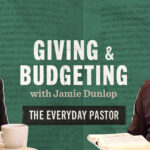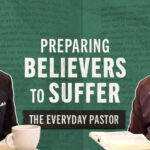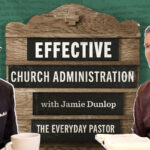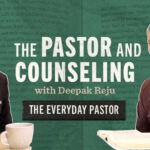Also in the On My Shelf series: Timothy George, Tim Keller, Bryan Chapell, Lauren Chandler, Mike Cosper, Russell Moore, Jared Wilson, Kathy Keller, J. D. Greear, Kevin DeYoung, Kathleen Nielson, Thabiti Anyabwile, Elyse Fitzpatrick, Collin Hansen, Fred Sanders, Rosaria Butterfield, Nancy Guthrie, and Matt Chandler.
On My Shelf helps you get to know various writers through a behind-the-scences glimpse into their lives as readers. I corresponded with Joe Carter—communications specialist for the ERLC, editor at The Acton Institute and The Gospel Coalition, and adjunct professor of journalism at Patrick Henry College—about what’s on his nightstand, some of his favorite works of fiction, and what books have most profoundly shaped him.
What’s on your nightstand right now?
I’m a slow reader (and even slower thinker), so I like to fool myself into reading more by reading a dozen books at a time. By reading 10 to 20 pages a day in each I delude myself into believing I’m actually making progress on my book pile. Currently I’m working my way through:
At Home: A Short History of Private Life by Bill Bryson. Bryson provides a fascinating intellectual history disguised as a tour of his home, a former Church of England rectory built in the 19th century.
Babbitt by Sinclair Lewis. I don’t appreciate when authors feel superior to their literary creations, so I’ve never been enthusiastic about Sinclair Lewis.
Physics for Future Presidents by Richard A. Muller. An introduction to the science behind public policy issues, like nuclear weapons and space programs. The chapter on energy has already made the book worth reading.
A History of the World in 100 Weapons by Chris McNab. A good explanation of how military technology—from flint axes to stealth fighters—has changed human history.
The Information by James Gleick. A fascinating account of the ways humans transfer information. The section on the talking drums of Africa is amazing.
The Glamour of Grammar by Roy Peter Clark. Not as useful as his previous book, Writing Tools, but Clark has a love of language that is infectious.
The Memoirs of U.S. Grant by Ulysses S. Grant. I wasn’t expecting the memoir of our 18th President to be so readable—or for Grant to be so relatable.
In Defense of War by Nigel Biggar. Biggar provides a helpful contribution to the debate about how Christians should consider the ethics of war and peace.
The Guns of August by Barbara Tuchman. Tuchman’s excellent work is helping me fill in the vast gaps in my knowledge about World War I.
King Henry V by Shakespeare. I’m trying to catch up on all the Shakespearean plays I’ve missed out on. So far, this is my favorite of his historical plays.
The Bees: A Novel by Laline Paull. This science fiction story, told from the perspective of a bumblebee, is a weird and intriguing examination of politics, religion, and individualism in a society that requires conformity.
Gospel and Kingdom by Graeme Goldworthy. TGC director of women’s initiatives Kathleen Nielson put it best: “A classic presentation of the Bible as one unified work centered in God’s redemption in Christ.”
What are your favorite fiction books?
The Bluest Eye by Toni Morrison
Ender’s Game by Orson Scott Card
The Sparrow and Children of God by Mary Doria Russell
Lonesome Dove, Leaving Cheyenne, and Cadillac Jack by Larry McMurtry
All the Pretty Horses, The Road, No Country for Old Men by Cormac McCarthy
World Made by Hand, The Witch of Hebron, A History of the Future by James Howard Kunstler
The Chronicles of Narnia by C. S. Lewis
What books have most profoundly shaped how you serve and lead others for the sake of the gospel?
If you had asked me two years ago I wouldn’t have known how to answer. I had always read for personal growth and not deliberately for the sake of serving others. But last month I finished a year-long writing project on spiritual disciplines. For research purposes I read more than a hundred books related to the topic. Here are three that will certainly shape how I serve and lead others in the future:
Overcoming Sin and Temptation by John Owen. You see this one recommended a lot—and for good reason. Owen isn’t an easy read, but this book is well worth the effort.
The Hole in Our Holiness by Kevin DeYoung. Kevin is such a superb writer and communicator that readers have come to expect his books will be worthwhile. And they are. But this one is different. This book is easily one of the best books on sanctification I’ve ever read—and I’ve plowed through a lot of them. I wish every Christian would read this book.
Jesus on Every Page: 10 Simple Ways to Seek and Find Christ in the Old Testament by David Murray. I’ve become convinced that if you’re not reading the Bible to better see Jesus, then you’re reading it wrong. There are probably a half-dozen books I could recommend on seeing Jesus in Scripture, but Murray’s is the one I’d suggest as a starting point.
What are you learning about life and following Jesus?
Unflinching, self-denying obedience to Christ is absolutely essential to the Christian life. I’ve been a believer more than 30 years, and for all that time I’d have nodded in agreement with that statement. But it was only during this past year of research and study that I truly began to understand and appreciate the role of obedience in the life of the Christian.
Obedience is such a core theme of the Bible that I don’t know how I missed it for so long. And now I don’t know what to do with that realization. Jesus says, “If you love me, you will keep my commandments” (John 14:15). Yet we live in a culture where obedience is considered an optional add-on to faith and the Christian life.
I feel compelled to tell everyone I see that we can’t truly love Jesus and follow Christ if we are not keeping his commands. But too many people will dismiss that message as “legalism” and refuse to hear that the only appropriate response to grace is eternal gratitude and unquestioning obedience to the Lord of the universe.
Download your free Christmas playlist by TGC editor Brett McCracken!
 It’s that time of year, when the world falls in love—with Christmas music! If you’re ready to immerse yourself in the sounds of the season, we’ve got a brand-new playlist for you. The Gospel Coalition’s free 2025 Christmas playlist is full of joyful, festive, and nostalgic songs to help you celebrate the sweetness of this sacred season.
It’s that time of year, when the world falls in love—with Christmas music! If you’re ready to immerse yourself in the sounds of the season, we’ve got a brand-new playlist for you. The Gospel Coalition’s free 2025 Christmas playlist is full of joyful, festive, and nostalgic songs to help you celebrate the sweetness of this sacred season.
The 75 songs on this playlist are all recordings from at least 20 years ago—most of them from further back in the 1950s and 1960s. Each song has been thoughtfully selected by TGC Arts & Culture Editor Brett McCracken to cultivate a fun but meaningful mix of vintage Christmas vibes.
To start listening to this free resource, simply click below to receive your link to the private playlist on Spotify or Apple Music.


































